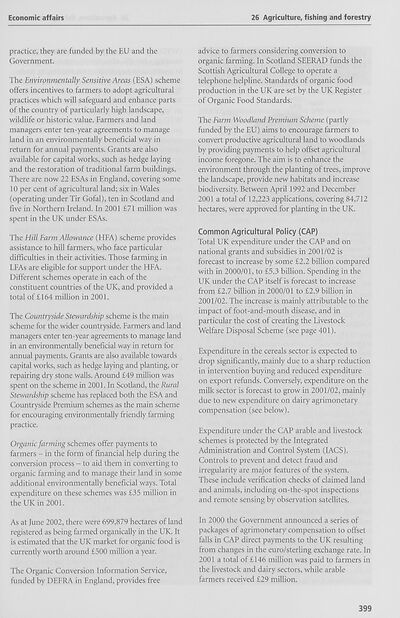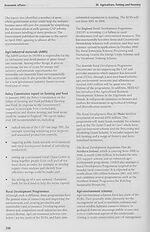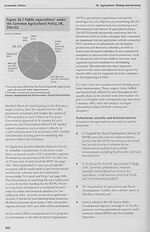Download files
Complete book:
Individual page:
Thumbnail gallery: Grid view | List view

Economic affairs
26 Agriculture, fishing and forestry
practice, they are funded by the EU and the
Government.
The Environmentally Sensitive Areas (ESA) scheme
offers incentives to farmers to adopt agricultural
practices which will safeguard and enhance parts
of the country of particularly high landscape,
wildlife or historic value. Farmers and land
managers enter ten-year agreements to manage
land in an environmentally beneficial way in
return for annual payments. Grants are also
available for capital works, such as hedge laying
and the restoration of traditional farm buildings.
There are now 22 ESAs in England, covering some
10 per cent of agricultural land; six in Wales
(operating under Tir Gofal), ten in Scotland and
five in Northern Ireland. In 2001 £71 million was
spent in the UK under ESAs.
The Hill Farm Allowance (HFA) scheme provides
assistance to hill farmers, who face particular
difficulties in their activities. Those farming in
LFAs are eligible for support under the HFA.
Different schemes operate in each of the
constituent countries of the UK, and provided a
total of £164 million in 2001.
The Countryside Stewardship scheme is the main
scheme for the wider countryside. Farmers and land
managers enter ten-year agreements to manage land
in an environmentally beneficial way in return for
annual payments. Grants are also available towards
capital works, such as hedge laying and planting, or
repairing dry stone walls. Around £49 million was
spent on the scheme in 2001. In Scotland, the Rural
Stewardship scheme has replaced both the ESA and
Countryside Premium schemes as the main scheme
for encouraging environmentally friendly farming
practice.
Organic farming schemes offer payments to
farmers - in the form of financial help during the
conversion process - to aid them in converting to
organic farming and to manage their land in some
additional environmentally beneficial ways. Total
expenditure on these schemes was £35 million in
the UK in 2001.
As at June 2002, there were 699,879 hectares of land
registered as being farmed organically in the UK. It
is estimated that the UK market for organic food is
currently worth around £500 million a year.
The Organic Conversion Information Service,
funded by DEFRA in England, provides free
advice to farmers considering conversion to
organic farming. In Scotland SEERAD funds the
Scottish Agricultural College to operate a
telephone helpline. Standards of organic food
production in the UK are set by the UK Register
of Organic Food Standards.
The Farm Woodland Premium Scheme (partly
funded by the EU) aims to encourage farmers to
convert productive agricultural land to woodlands
by providing payments to help offset agricultural
income foregone. The aim is to enhance the
environment through the planting of trees, improve
the landscape, provide new habitats and increase
biodiversity. Between April 1992 and December
2001 a total of 12,223 applications, covering 84,712
hectares, were approved for planting in the UK.
Common Agricultural Policy (CAP)
Total UK expenditure under the CAP and on
national grants and subsidies in 2001/02 is
forecast to increase by some £2.2 billion compared
with in 2000/01, to £5.3 billion. Spending in the
UK under the CAP itself is forecast to increase
from £2.7 billion in 2000/01 to £2.9 billion in
2001/02. The increase is mainly attributable to the
impact of foot-and-mouth disease, and in
particular the cost of creating the Livestock
Welfare Disposal Scheme (see page 401).
Expenditure in the cereals sector is expected to
drop significantly, mainly due to a sharp reduction
in intervention buying and reduced expenditure
on export refunds. Conversely, expenditure on the
milk sector is forecast to grow in 2001/02, mainly
due to new expenditure on dairy agrimonetary
compensation (see below).
Expenditure under the CAP arable and livestock
schemes is protected by the Integrated
Administration and Control System (IACS).
Controls to prevent and detect fraud and
irregularity are major features of the system.
These include verification checks of claimed land
and animals, including on-the-spot inspections
and remote sensing by observation satellites.
In 2000 the Government announced a series of
packages of agrimonetary compensation to offset
falls in CAP direct payments to the UK resulting
from changes in the euro/sterling exchange rate. In
2001 a total of £146 million was paid to farmers in
the livestock and dairy sectors, while arable
farmers received £29 million.
399
26 Agriculture, fishing and forestry
practice, they are funded by the EU and the
Government.
The Environmentally Sensitive Areas (ESA) scheme
offers incentives to farmers to adopt agricultural
practices which will safeguard and enhance parts
of the country of particularly high landscape,
wildlife or historic value. Farmers and land
managers enter ten-year agreements to manage
land in an environmentally beneficial way in
return for annual payments. Grants are also
available for capital works, such as hedge laying
and the restoration of traditional farm buildings.
There are now 22 ESAs in England, covering some
10 per cent of agricultural land; six in Wales
(operating under Tir Gofal), ten in Scotland and
five in Northern Ireland. In 2001 £71 million was
spent in the UK under ESAs.
The Hill Farm Allowance (HFA) scheme provides
assistance to hill farmers, who face particular
difficulties in their activities. Those farming in
LFAs are eligible for support under the HFA.
Different schemes operate in each of the
constituent countries of the UK, and provided a
total of £164 million in 2001.
The Countryside Stewardship scheme is the main
scheme for the wider countryside. Farmers and land
managers enter ten-year agreements to manage land
in an environmentally beneficial way in return for
annual payments. Grants are also available towards
capital works, such as hedge laying and planting, or
repairing dry stone walls. Around £49 million was
spent on the scheme in 2001. In Scotland, the Rural
Stewardship scheme has replaced both the ESA and
Countryside Premium schemes as the main scheme
for encouraging environmentally friendly farming
practice.
Organic farming schemes offer payments to
farmers - in the form of financial help during the
conversion process - to aid them in converting to
organic farming and to manage their land in some
additional environmentally beneficial ways. Total
expenditure on these schemes was £35 million in
the UK in 2001.
As at June 2002, there were 699,879 hectares of land
registered as being farmed organically in the UK. It
is estimated that the UK market for organic food is
currently worth around £500 million a year.
The Organic Conversion Information Service,
funded by DEFRA in England, provides free
advice to farmers considering conversion to
organic farming. In Scotland SEERAD funds the
Scottish Agricultural College to operate a
telephone helpline. Standards of organic food
production in the UK are set by the UK Register
of Organic Food Standards.
The Farm Woodland Premium Scheme (partly
funded by the EU) aims to encourage farmers to
convert productive agricultural land to woodlands
by providing payments to help offset agricultural
income foregone. The aim is to enhance the
environment through the planting of trees, improve
the landscape, provide new habitats and increase
biodiversity. Between April 1992 and December
2001 a total of 12,223 applications, covering 84,712
hectares, were approved for planting in the UK.
Common Agricultural Policy (CAP)
Total UK expenditure under the CAP and on
national grants and subsidies in 2001/02 is
forecast to increase by some £2.2 billion compared
with in 2000/01, to £5.3 billion. Spending in the
UK under the CAP itself is forecast to increase
from £2.7 billion in 2000/01 to £2.9 billion in
2001/02. The increase is mainly attributable to the
impact of foot-and-mouth disease, and in
particular the cost of creating the Livestock
Welfare Disposal Scheme (see page 401).
Expenditure in the cereals sector is expected to
drop significantly, mainly due to a sharp reduction
in intervention buying and reduced expenditure
on export refunds. Conversely, expenditure on the
milk sector is forecast to grow in 2001/02, mainly
due to new expenditure on dairy agrimonetary
compensation (see below).
Expenditure under the CAP arable and livestock
schemes is protected by the Integrated
Administration and Control System (IACS).
Controls to prevent and detect fraud and
irregularity are major features of the system.
These include verification checks of claimed land
and animals, including on-the-spot inspections
and remote sensing by observation satellites.
In 2000 the Government announced a series of
packages of agrimonetary compensation to offset
falls in CAP direct payments to the UK resulting
from changes in the euro/sterling exchange rate. In
2001 a total of £146 million was paid to farmers in
the livestock and dairy sectors, while arable
farmers received £29 million.
399
Set display mode to:
![]() Universal Viewer |
Universal Viewer | ![]() Mirador |
Large image | Transcription
Mirador |
Large image | Transcription
The item on this page appears courtesy of Office for National Statistics and may be re-used under the Open Government Licence for Public Sector Information.
| Britain and UK handbooks > UK: The official yearbook of the United Kingdom of Great Britain and Northern Ireland > 2003 > (445) |
|---|
| Permanent URL | https://digital.nls.uk/204928898 |
|---|
| Attribution and copyright: |
|
|---|---|
| Description | Three volumes of 'UK: The official yearbook of the United Kingdom of Great Britain and Northern Ireland', published annually by the Office of National Statistics from 2002-2005. |
|---|---|
| Shelfmark | GII.11 SER |
| Description | Three titles produced by the British Government from 1954-2005 describing 'how Britain worked'. They are: 'Britain: An official handbook' (1954-1998), 'Britain: The official yearbook of the United Kingdom' (1999-2001), and 'UK: The official yearbook of the United Kingdom of Great Britain and Northern Ireland' (2002-2005). These 50 reports provide an overview of Britain's economic, social and cultural affairs, its environment, international relations, and the systems of government. They give an impartial summary of government policies and initiatives, and explain how public services are organised. |
|---|---|
| Additional NLS resources: |
|

